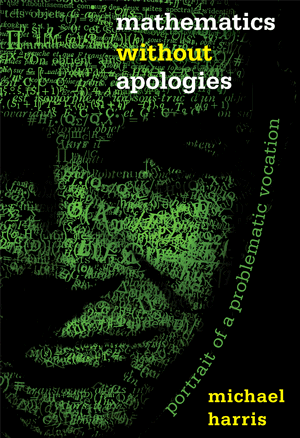“La libertad es como un número primo.” Roberto Bolaño, Los Detectives Salvajes
Michael Harris’ mathematics without apologies, I said it elsewhere, is a must-read if you are interested in mathematics. And probably even more, if you are not. But again, it is not an easy reading.
After the claim in his Chapter 3 that mathematics was “Not Merely Good, True and Beautiful”, Harris goes on with provocative and thoughful arguments about the relations that mathematics have with Money (Chapter 4 – Megaloprepeia), with the Body (Chapter 6 – Further Investigations of the Mind-Body problem), with Foundations (Chapter 7 – The Habit of Clinging to an Ultimate Ground) and even with tricks (Chapter 8 – The Science of Tricks), Harris finally comes back to Apologies after a personal chapter about inspiration and work (Chapter 9 – A Mathematical Dream and Its Interpretation).
The author made me discover, shame on me, that “apology” does not mean only praise, but also excuse or defense. Difficulty and confusion of the vocabulary, indeed a recurrent theme of Harris’ book. Let me be quite clear again. I did not understand everything and I imagined Harris could have created a new index. As you may know if you read my blog, I mention Indices from time to time, like the Erdős Index, the Tesla Index. This new Index could be 0 for Maths Giants or Supergiants, humans who could be awarded the Fields Medal, the Abel Prize or equivalent, 1 for those who can understand (everything) that has been written in mathematics by those with 0 Index; then 2, for those who can understand (everything) that has been written in mathematics by those with 1 Index, etc… I do not know where the index would stop and perhaps it already exists… I would like to believe that I was at the Index 3 but not sure! But then I made my discovery about “apology”, I put myself down at Index 5…
Harris goes even stronger than Hardy with his “No Apologies” even if he quotes him: Irony has not spoken its last word on the flight from utility [of science], even when utility is understood, with Hardy, as that which “tends to accentuate the existing inequalities in the distribution of wealth”. [Page 296] I think harris has written a very useful book about mathematics. I add another example on the nature of mathematical beauty: “there is a very high degree of unexpectedness, combined with inevitability and economy” [Page 307].
When looking for more information about harris, I found his web page which begins with the quote i give above from Bolaño. When I discovered Bolaño a few years ago, it was such a shock that I read everything I could find. Again without understanding everything. But if you read Harris’ chapter 9, you will undestand that “not understanding everything” may not be that important, compared to the impact that (apparent) confusion may create…
PS: I could have added that while I was reading Harris, a controversy arose around a new solution for the P vs. NP problem. More about this in a detailed pdf and on its author’s blog. I also should have mentioned the Langlands program and Alexander Grothendieck, whom I also mentioned here. But again Harris book is so rich…

